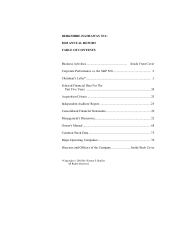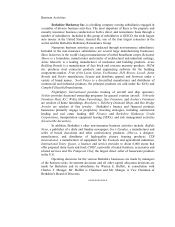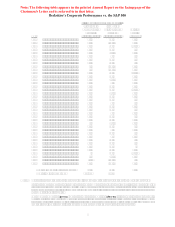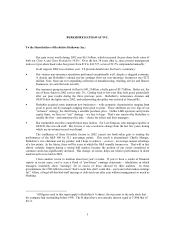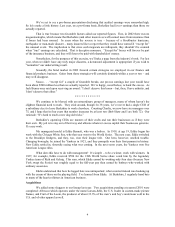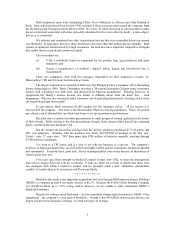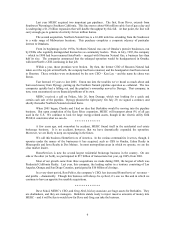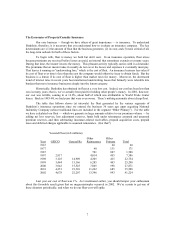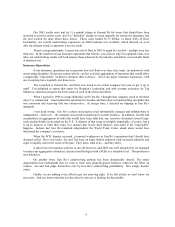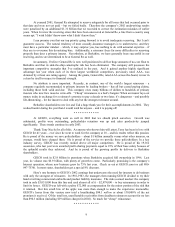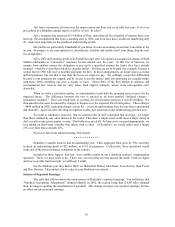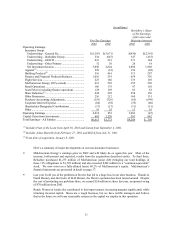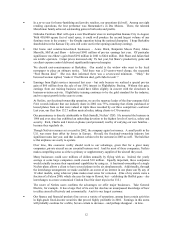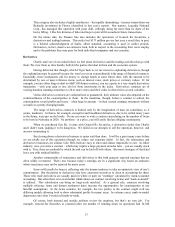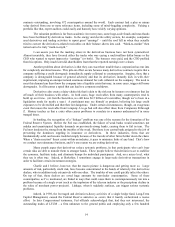Berkshire Hathaway 2002 Annual Report Download - page 5
Download and view the complete annual report
Please find page 5 of the 2002 Berkshire Hathaway annual report below. You can navigate through the pages in the report by either clicking on the pages listed below, or by using the keyword search tool below to find specific information within the annual report.4
We’ ve yet to see a pro-forma presentation disclosing that audited earnings were somewhat high.
So let’ s make a little history: Last year, on a pro-forma basis, Berkshire had lower earnings than those we
actually reported.
That is true because two favorable factors aided our reported figures. First, in 2002 there was no
megacatastrophe, which means that Berkshire (and other insurers as well) earned more from insurance than
if losses had been normal. In years when the reverse is true – because of a blockbuster hurricane,
earthquake or man-made disaster – many insurers like to report that they would have earned X “except for”
the unusual event. The implication is that since such megacats are infrequent, they shouldn’ t be counted
when “true” earnings are calculated. That is deceptive nonsense. “Except for” losses will forever be part
of the insurance business, and they will forever be paid with shareholders’ money.
Nonetheless, for the purposes of this exercise, we’ ll take a page from the industry’ s book. For last
year, when we didn’ t have any truly major disasters, a downward adjustment is appropriate if you wish to
“normalize” our underwriting result.
Secondly, the bond market in 2002 favored certain strategies we employed in our finance and
financial products business. Gains from those strategies will certainly diminish within a year or two – and
may well disappear.
Soooo . . . “except for” a couple of favorable breaks, our pre-tax earnings last year would have
been about $500 million less than we actually reported. We’ re happy, nevertheless, to bank the excess. As
Jack Benny once said upon receiving an award: “I don’ t deserve this honor – but, then, I have arthritis, and
I don’ t deserve that either.”
* * * * * * * * * * * *
We continue to be blessed with an extraordinary group of managers, many of whom haven’ t the
slightest financial need to work. They stick around, though: In 38 years, we’ ve never had a single CEO of
a subsidiary elect to leave Berkshire to work elsewhere. Counting Charlie, we now have six managers over
75, and I hope that in four years that number increases by at least two (Bob Shaw and I are both 72). Our
rationale: “It’ s hard to teach a new dog old tricks.”
Berkshire’ s operating CEOs are masters of their crafts and run their businesses as if they were
their own. My job is to stay out of their way and allocate whatever excess capital their businesses generate.
It’ s easy work.
My managerial model is Eddie Bennett, who was a batboy. In 1919, at age 19, Eddie began his
work with the Chicago White Sox, who that year went to the World Series. The next year, Eddie switched
to the Brooklyn Dodgers, and they, too, won their league title. Our hero, however, smelled trouble.
Changing boroughs, he joined the Yankees in 1921, and they promptly won their first pennant in history.
Now Eddie settled in, shrewdly seeing what was coming. In the next seven years, the Yankees won five
American League titles.
What does this have to do with management? It’ s simple – to be a winner, work with winners. In
1927, for example, Eddie received $700 for the 1/8th World Series share voted him by the legendary
Yankee team of Ruth and Gehrig. This sum, which Eddie earned by working only four days (because New
York swept the Series) was roughly equal to the full-year pay then earned by batboys who worked with
ordinary associates.
Eddie understood that how he lugged bats was unimportant; what counted instead was hooking up
with the cream of those on the playing field. I’ ve learned from Eddie. At Berkshire, I regularly hand bats
to many of the heaviest hitters in American business.
Acquisitions
We added some sluggers to our lineup last year. Two acquisitions pending at yearend 2001 were
completed: Albecca (which operates under the name Larson-Juhl), the U.S. leader in custom-made picture
frames; and Fruit of the Loom, the producer of about 33.3% of the men’ s and boy’ s underwear sold in the
U.S. and of other apparel as well.

